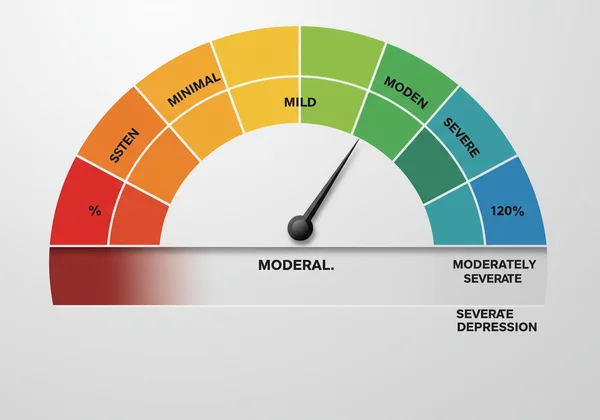After Your Depression Test: Understanding & Managing Results
September 15, 2025 | By Liam Thornton
Receiving the results of a depression test can be a moment filled with questions. You’ve taken a significant first step in understanding your emotional well-being, but you might be wondering, what now? This comprehensive guide is designed to help you interpret your results, navigate your feelings, and explore the actionable steps you can take. Your journey toward clarity and better mental health starts with understanding, and we're here to walk you through it. If you haven't taken an assessment yet, you can start your free test today.
Understanding Your Depression Test Score
The score you received is a starting point—a snapshot of your current emotional state. It's based on your responses to questions designed from established psychiatric screening tools, like the PHQ-9. Think of it not as a definitive label, but as a helpful indicator that can guide your next actions. Understanding this score is the first part of post-test guidance.

What Your Score Might Mean: From Mild to Severe
Screening tools typically categorize results into different levels to help contextualize the symptoms you're experiencing. While each test may vary slightly, the classifications generally follow a pattern reflecting depression levels.
- Minimal or No Depression: A low score suggests you may not be experiencing significant depressive symptoms. However, it's still important to practice good self-care and monitor your mood.
- Mild Depression: This score might indicate the presence of some symptoms that are noticeable but may not be dramatically impacting your daily life. It’s an ideal time to focus on proactive lifestyle changes and coping strategies.
- Moderate Depression: In this range, symptoms are likely interfering with your work, social life, or home responsibilities. It is strongly recommended to discuss these results with a healthcare professional.
- Moderately Severe to Severe Depression: A high score suggests that symptoms are persistent, distressing, and significantly impacting your ability to function. Seeking professional help should be a top priority.
Remember, these are general guidelines. The true meaning of your score is best understood in the context of your unique life and experiences.
The Nuances of Self-Assessment: Limitations & Professional Insights
Online tools provide valuable insights, but it's crucial to recognize their limitations. A free depression test is a screening tool, not a diagnostic one. It cannot capture the full picture of your mental health in the way a conversation with a trained professional can.
Factors like physical health conditions, life stressors, and other underlying issues can influence your score. Therefore, the most important takeaway is to use this result as a catalyst for a deeper conversation. A mental health professional or doctor can provide an accurate diagnosis and help you create a tailored treatment plan. Consider your result from the online depression test as the first step in a larger journey.
Disclaimer: This article provides information for educational purposes only and is not a substitute for professional medical advice, diagnosis, or treatment. Always seek the advice of your physician or another qualified health provider with any questions you may have regarding a medical condition.
Navigating Your Next Steps After a Depression Test
So, you have your results. Let’s focus on what you can do next. Whether your score was low or high, this is an opportunity to be proactive about your mental health. This is where managing depression begins, with small, intentional actions.
Empowering Self-Care & Lifestyle Changes for Well-being
Regardless of your score, integrating positive habits into your daily routine can significantly improve your mood and resilience. These lifestyle changes are powerful tools for managing your well-being.
-
Mindful Movement: Regular physical activity, even a 20-minute walk, releases endorphins and can reduce symptoms of depression.
-
Balanced Nutrition: What you eat affects your brain. Focus on a diet rich in fruits, vegetables, lean proteins, and omega-3 fatty acids.
-
Prioritize Sleep: Aim for 7-9 hours of quality sleep per night. A consistent sleep schedule helps regulate mood.
-
Stress Management: Incorporate coping strategies like mindfulness, meditation, or deep-breathing exercises to manage daily stressors.
-
Social Connection: Make time for friends and family. Meaningful connections are a powerful buffer against feelings of isolation.

When & How to Seek Professional Support & Therapy Options
If your results indicate moderate to severe symptoms, or if you simply feel overwhelmed, seeking help for depression is a sign of strength. Knowing when to reach out is key. Consider scheduling a mental health doctor visit if you experience persistent low mood, loss of interest in activities, or significant changes in your sleep or appetite.
Starting the conversation can be daunting. You can begin by telling your primary care physician, "I took an online depression screening, and my results concerned me. Can we talk about it?" They can rule out other medical causes and refer you to a mental health specialist, such as a therapist, psychologist, or psychiatrist. Therapy options like Cognitive Behavioral Therapy (CBT) and Interpersonal Therapy (IPT) have been proven effective.

Exploring Medication: Is It Right for Your Journey?
For some individuals, medication can be a helpful component of a comprehensive treatment plan, often used in conjunction with therapy. Antidepressants work by balancing chemicals in your brain called neurotransmitters that affect mood and emotions.
The decision to take medication is a personal one and should be made in close consultation with a qualified healthcare provider. They will discuss the potential benefits, risks, and side effects to help you determine if it's the right choice for your journey. This is a critical part of understanding depression diagnosis and treatment options.
Building a Long-Term Depression Management Plan
Managing mental health is an ongoing process, not a one-time fix. Creating a sustainable plan empowers you to navigate challenges and cultivate lasting well-being. This requires consistency and the right tools for post-test guidance.
Consistent Support Systems & Ongoing Self-Monitoring
Your support system is your foundation. This can include trusted family members, friends, support groups, or a therapist. Regularly checking in with these individuals can provide encouragement and accountability.
Self-monitoring is also crucial. This could be as simple as journaling your moods or using an app to track symptoms. Regular self-assessment, like retaking a depression screening test periodically, can help you and your provider gauge progress and adjust your management plan as needed.
Unlock Deeper Insights with Your AI-Powered Personalized Report
A simple score only tells part of the story. To truly understand your situation, you need deeper insights into your personal strengths, challenges, and how your symptoms impact your daily life. This is where our unique features can make a real difference.

After completing the initial assessment on our site, you have the option to answer a few more questions to unlock an AI-powered report. This detailed analysis goes beyond a number, offering you:
- Personalized Insights: Understand your specific pain points and strengths.
- Daily Impact Analysis: See how your emotional state may be affecting different areas of your life.
- Actionable Next Steps: Receive a tailored plan with concrete suggestions for self-care and professional support.
This report is designed to empower you with the clarity needed to move forward confidently. Get your results and discover a path tailored just for you.

Your Journey to Understanding and Managing Depression Starts Here
Taking a depression test is a courageous act of self-awareness. Your result is not an end point; it is a signpost pointing you toward greater understanding and a healthier future. By interpreting your score, exploring actionable steps, and building a long-term plan, you are taking control of your mental wellness journey.
Remember, you are not alone. Resources and support are available. Continue to explore, learn, and take small, consistent steps forward. We encourage you to visit our homepage to explore our tool and access more resources designed to support you.
Frequently Asked Questions After a Depression Test
What does my depression test score mean?
Your depression test score is an indicator of the severity of symptoms you may be experiencing, ranging from mild to severe. It is a valuable starting point for self-reflection and a conversation with a healthcare professional, but it is not a medical diagnosis. For a deeper understanding beyond the score, consider the personalized report available after you take a depression test.
Am I depressed or just sad?
Sadness is a normal human emotion that is usually temporary and tied to a specific event. Depression, on the other hand, is a persistent state of low mood, loss of interest, and other emotional and physical problems that significantly impair daily functioning. A screening tool can help you see if your symptoms align more closely with a depressive disorder.
How do I know if I need professional help after my depression test?
It is a good idea to consult a professional if your symptoms are persistent (lasting more than two weeks), distressing, or interfering with your ability to function at work, school, or in your relationships. A score in the moderate to severe range on an online depression test is a strong indicator that you should seek a professional consultation.
Can a blood test detect depression?
Currently, there is no blood test that can diagnose depression. A diagnosis is made by a qualified healthcare professional based on a comprehensive evaluation of your symptoms, experiences, and medical history. However, a doctor may order blood tests to rule out other medical conditions, like thyroid problems, that can mimic symptoms of depression.